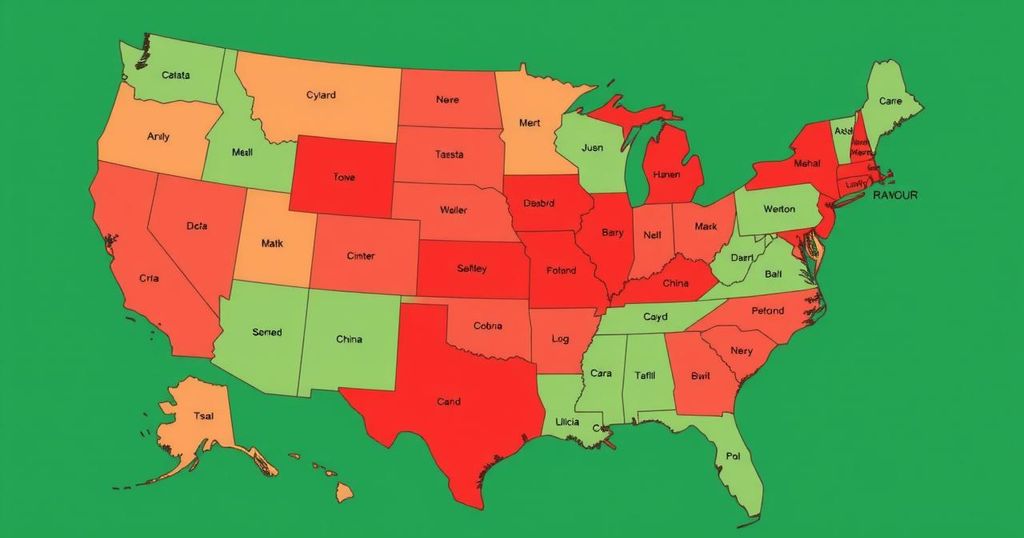Cars
ASIA, AUTOMOTIVE INDUSTRY, BIDEN, BIDEN ADMINISTRATION, BRAZIL, CALIFORNIA, CHINA, CHRYSLER CORP, COLIN LANGAN, DONALD TRUMP, EUROPE, EUROPE/ASIA, FORD, GEOPOLITICS, HUNGARY, LANGAN, MEXICO, NATIONAL SECURITY, NISSAN MOTOR CO. LTD, NORTH AMERICA, RUSSIA, SOUTH AMERICA, SPAIN, STATES, TARIFFS, U. S, UNITED STATES, US-CHINA RELATIONS, WELLS FARGO SECURITIES
Lena Nguyen
0 Comments
U.S. States’ Division on Welcoming Chinese Automakers Amid Security Concerns
U.S. states exhibit varied responses to the prospect of welcoming Chinese automakers. While the potential for job creation is enticing, national security concerns raise questions. Analysts predict a Chinese automaker may soon establish operations in the U.S. with significant challenges ahead, including brand recognition and regulatory barriers. Some states support potential investments, while others stand firmly against Chinese projects, indicating a complex relationship surrounding foreign involvement in domestic manufacturing.
In the United States, states exhibit divergent responses regarding the welcome of a billion-dollar investment from a Chinese automaker. While the promise of job creation is tempting, national security concerns and public hesitance remain significant factors. Although some analysts predict that a new Chinese automaker will commence manufacturing within the U.S. in the next few years, increasing tariffs and regulations raise questions about the feasibility of such ventures.
Colin Langan, an analyst at Wells Fargo Securities, emphasized the potential urgency for state governors to consider economic impacts. He suggested, “If you’re a governor of a state, as much as you might be anti-China, are you going to allow 5,000 people to be unemployed because you refuse to let the Chinese in?” Current conditions may favor partnerships with existing automakers rather than new plants from scratch, an approach seen in Europe and other markets.
With the upcoming regulations disallowing vehicles with Chinese technology, new entrants may require substantial investments. This could restrict entry unless manufacturers build vehicles entirely anew, emphasizing the distinct barriers that exist. The Trump administration previously expressed favorable views towards welcoming Chinese ventures, provided American workers are primarily employed.
Chinese manufacturers, such as BYD Co. Ltd., are already manufacturing in different regions across the globe, including Brazil and Hungary. However, entering the U.S. market poses unique challenges due to brand recognition issues—many Americans may remain unfamiliar with these brands. Moreover, Langan noted, “That would be building a plant before they start a brand,” stressing the marketing efforts required for acceptance.
Some U.S. states have pledged support for projects from Chinese automakers, while others remain staunchly opposed. For example, Michigan offers support to certain Chinese entities like Gotion Inc., while still expressing apprehensions regarding the risks posed by affiliated firms. Gov. Gretchen Whitmer has voiced strong opposition to compromising local auto jobs, confirming her commitment to protecting Michigan’s automotive industry.
In contrast, Texas and South Carolina have taken definitive stances against collaborating with firms from China, denoting these entities as national security threats. Georgia prohibits investments from foreign adversaries near military installations, reflecting a comprehensive assessment of potential risks. Conversely, New Mexico is open to automotive projects from all global players, highlighting its readiness to contribute to job creation while remaining attentive to security measures.
Several states, predominantly led by Republican governors, have actively avoided Chinese investments. This includes Tennessee and Alabama, whose officials maintain clear positions against engaging with Chinese automakers. The approach varies across states, reflecting a broader national debate over economic interests versus strategic security concerns.
Existing manufacturing plants may present alternative avenues for entry rather than establishing new production lines. Locations such as the Lordstown Assembly in Ohio and idled plants across the U.S. could serve as potential sites for Chinese automakers to leverage opportunities more effectively. However, industry leaders voice caution regarding speculative proposals for partnerships or reactivation, as market conditions fluctuate.
Ultimately, U.S. states face a delicate balancing act of navigating economic growth while ensuring national security remains a priority. The evolving landscape illustrates the complex dialogue surrounding foreign investment in domestic sectors, particularly amid increasing geopolitical tensions.
The desire for substantial foreign investment in the U.S. automotive sector is tempered by national security concerns and fluctuating economic realities. Some states welcome Chinese automakers with open arms, hoping for significant job creation, while others remain hesitant due to fears of compromised national interests. The push for Chinese manufacturing in the U.S. must navigate a landscape of regulatory challenges and potential reputational hurdles, highlighting a national discourse that weighs economic benefits against security risks.
Original Source: www.detroitnews.com




Post Comment